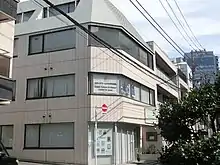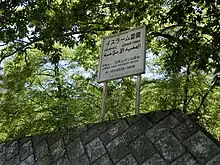Japan Muslim Association
The Japan Muslim Association (日本ムスリム協会, nihon musurimu kyōkai) (JMA) is the first Muslim congregation in Japan.[1] Founded in 1952 by 47 members,[2] it was chartered as a religious corporation in June 1968.[1][3] It aims to create a path for the Muslim minority to practice the doctrines of Islam while in harmony with Japanese society.[1] Since its inception, the Association has dispatched its members to Islamic countries as exchange students, and the number has reached 60.

History
The Japan Muslim Association was initially founded in 1952 when 47 Japanese Muslims and scholars who were engaged during World War II in intelligence gathering work in Asian countries formed the "Society of Islamic Friends."[4][5] In 1953, it was renamed to the current "Japanese Muslim Association." Since 1957, the Association has sent Muslims to Islamic universities such as the Al-Azhar University in Egypt, and in 1959, it launched the official bulletin, the Voice of Islam.[4] In 1968, the Association was registered as a religious corporation. The number of members during this period was about 60, according to the Voice of Islam. In 1961, the Muslim Students Association was founded with Muslim international students as its core members, and in 1963, the Association for Islamic Studies in Japan was established as an academic society.[4]
In 2009, the Association was invited to an Iftar (dinner to end Ramadan fasting) held at the Kuwaiti Embassy in Tokyo.[6] In 2015, the Association joined other Islamic organizations and mosques in Japan in support of the Nagoya Mosque's request to the Japanese mass media to change their use of the term Islamic State for the ISIL (Islamic State of Iraq and the Levant) to something else.[7] In 2020, in response to the COVID-19 pandemic, the Association collaborated with more than 30 Islamic organizations and groups, such as Islamic Center Japan and Hokkaido Islamic Society, to avoid Ramadan gatherings and for Imams (Islamic leaders of prayer in mosques) to hold online classes for Muslims.[8]
Activity
Publishing
The Japan Muslim Association publishes various religious texts, such as the Qur’an and Tafsir, available upon inquiry with shipping fees.

Operation of Muslim Cemeteries
In 1963, the Japan Muslim Association purchased the land of a Buddhist temple, Monjuin, and in 1969, with the approval of Yamanashi Prefecture, it established Japan's first Muslim cemetery in Enzan city, covering 85,400 square feet in nine sections. It has been in operation to this day.[9] In 2000, the burial plots were expanded in response to the increase in the number of Muslims in the country. Initially, this cemetery was established as a cemetery for Muslims from all over the world, but the Association changed the name to a Cemetery for Japanese Muslims.[4]
Halal Certification
Halal refers to sanctioned activities (e.g., promises, contracts, jobs) and objects (e.g., food, drinks, cosmetics) under Islamic law. Under it, eating pork is prohibited, and other food products must be processed and cooked by designated methods. Foods that comply with these rules are considered Halal. In Japan, halal foods were mainly sold at grocery stores for Muslims in the country, but in recent years, restaurants that provide halal food have also appeared. In addition, responding to the recent increase in the number of international students from Islamic countries, some universities (e.g., Tohoku University, Kyushu University, University of Yamanashi, and the International University of Japan) have begun to add Halal food to their student cafeteria menus. According to the National Federation of University Co-operative Associations, as of 2014, at least 19 university co-ops in Japan serve halal food.[10]
Japan Muslim Association is accredited by the international halal certification bodies, such as the Department of Islamic Development Malaysia, Indonesia's Majelis Ulama Council Food, Drug, and Cosmetic Inspection Agency,[11] and Cosmetics, and Islamic Religious Council of Singapore.[12][13] Of these, the only domestic halal certification body in the food sector certified by the Indonesian Ulama Council is the Japan Muslim Association as of 2014.[14] The Association also has a partnership with the Kyoto Halal Council, a local halal certification organization in Kyoto City.[15]
Successive Association Presidents[16]
| 1st | Sadiq Yoshio Imaizumi | 1953–1960 |
| 2nd | Umar Ryoichi Mita | 1960–1962 |
| 3rd | Abdulkareem Atsuhira Saito | 1962–1971 |
| 4th | Abu Bakr Takeo Morimoto | 1971–1974 |
| 5th | Abdulmunir Shoji Watanabe | 1974–1977 |
| 6th | Omar Yojiro Iokibe | 1977–1984 |
| 7th | Abdul Salam Jiro Arimi | 1984–1986 |
| 8th | Zubeir Hakuro Suzuki | 1986–1990 |
| 9th | Khalid Mimasaka Higuchi | 1990–2003 |
| 10th | Amin Kimiaki Tokumasu | 2003–2021 |
| 11th | Yahya Toshio Endo | 2021–Present |
References
- "日本ムスリム協会とは" [What is the Japan Muslim Association?]. Japan Muslim Association. Retrieved November 3, 2022.
- Tanada, Hirofumi (2015). 日本のモスク―滞日ムスリムの社会的活動 [Mosques in Japan: Social Activities of Muslims in Japan]. Tokyo: Yamakawa Shuppansha. ISBN 978-4-634-47474-1.
- Sato, Shigeru (2015-01-23). "イスラム教徒200人、渋谷区内のモスクで邦人人質事件に祈りと憤り" [200 Muslims pray and resent the Japanese hostage incident at a mosque in Shibuya Ward]. Bloomberg. Retrieved November 3, 2022.
- Higuchi, Yuji (2005). "埋葬状況からみた在日ムスリムコミュニティ" [Muslim community in Japan, from a perspective of form of the burial]. Jomin Bunka. 28: 43–69.
- Hirahata, Tsunehiro (2018-07-18). "日本初のムスリム霊園、実は山梨だった! 建設の裏、奇跡のお告げ" [Japan’s first Muslim cemetery, actually in Yamanashi! Behind the construction, a miracle revelation]. Asahi Shimbun. Retrieved November 3, 2022.
- "東京、9月11日 駐日クウェート大使、IFTAR(イフタール)断食打破夕食会を主催する" [Kuwaiti Ambassador holds Iftar for Muslim community in Tokyo September 11, 2009]. Embassy of the State of Kuwait in Japan. Retrieved November 3, 2022.
- "連名による要望:「イスラム国」という名称の変更を希望します" [Joint Petition: Request to Change the Name, "Islamic State"]. Nagoya Mosque. 2015-02-01. Retrieved November 3, 2022.
- Azhari, Khaldon (2020-04-23). "日本のムスリムがラマダンの集会を回避へ" [Japanese Muslims to avoid Ramadan gatherings]. Arab News Japan. Saudi Research and Publishing Company. Retrieved November 3, 2022.
- "日本のイスラム教徒永眠の地は 土葬の墓、住民ら反発" [The final resting place of Japanese Muslims is a burial grave. Residents protest]. Asahi Shimbun. 2010-10-18. Retrieved November 3, 2022.
- "イスラム学生も安心、学食でも「ハラール」食" [Muslim students can enjoy halal food in school cafeterias]. Yomiuri Shimbun. 2014-05-29. Retrieved November 3, 2022.
- Murakami, Yuya (2016). "輸出に向けたイスラーム食品市場の概観:~醸造食品におけるハラール対応の留意点を踏まえて~" [An overview of the Islamic food market for export: Based on halal compliance considerations for brewed foods]. Journal of the Japan Brewers Association. 111 (11): 728–735. Retrieved November 3, 2022.
- World Economy Research Group (2015). 「いま」の日本が知っておくべきアジア情勢 [The Asian Situation That Japan Should Know Now]. PHP Research Institute. p. 123. ISBN 978-4-569-82431-4.
- "主なハラル(ハラール)認証団体" [Major halal certification organizations]. Japan Food Barriers Association. Retrieved November 6, 2022.
- Kono, Takuichi (February 2017). "ハラール認証と日本の食品企業・地域農業の付加価値戦略" [Halal certification and value-added strategies of Japanese food industry and local agriculture]. Frontier Agricultural Economics Research. Hokkaido Agricultural Economics Association. 20 (1): 33–44. Retrieved November 6, 2022.
- "よくある質問" [Frequently asked questions]. Kyoto Halal Council. Retrieved November 6, 2022.
- 創立50周年記念 協会小史 [Commemoration of the 50th Anniversary: Short History of the Association]. Japan Muslim Association. 2004-03-28. pp. 3–11.